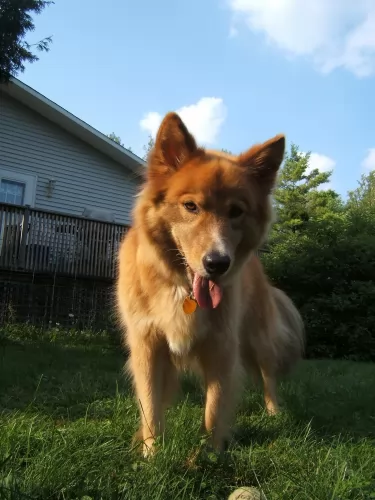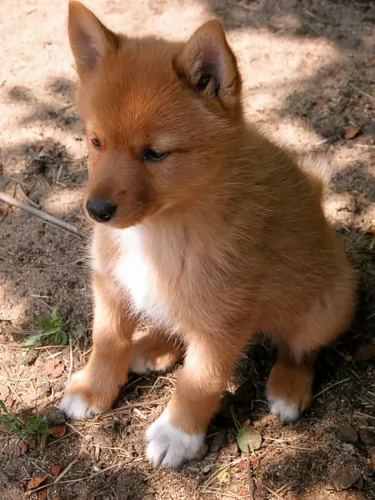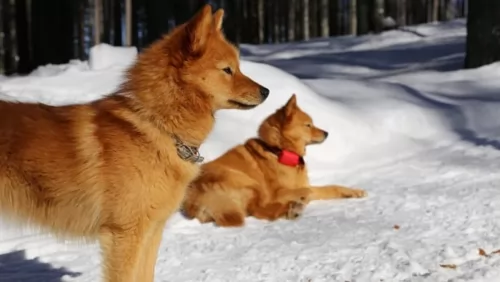 Petzlover
Petzlover Karelo-Finnish Laika is originated from Russia but Seppala Siberian Sleddog is originated from Canada. Karelo-Finnish Laika may grow 10 cm / 3 inches shorter than Seppala Siberian Sleddog. Karelo-Finnish Laika may weigh 9 kg / 19 pounds lesser than Seppala Siberian Sleddog. Both Karelo-Finnish Laika and Seppala Siberian Sleddog has same life span. Karelo-Finnish Laika may have more litter size than Seppala Siberian Sleddog. Karelo-Finnish Laika requires Low Maintenance. But Seppala Siberian Sleddog requires Moderate Maintenance
Karelo-Finnish Laika is originated from Russia but Seppala Siberian Sleddog is originated from Canada. Karelo-Finnish Laika may grow 10 cm / 3 inches shorter than Seppala Siberian Sleddog. Karelo-Finnish Laika may weigh 9 kg / 19 pounds lesser than Seppala Siberian Sleddog. Both Karelo-Finnish Laika and Seppala Siberian Sleddog has same life span. Karelo-Finnish Laika may have more litter size than Seppala Siberian Sleddog. Karelo-Finnish Laika requires Low Maintenance. But Seppala Siberian Sleddog requires Moderate Maintenance
 The Karelo Finnish Laika is a Spitz type hunting dog from the Karelia area of Russia.Some people say the dog developed in Sweden. The dog is from a group of ‘Laika’ breeds and has that typical Spitz-type look – the sharpish face, the erect ears and the tail which curls over the back.
The Karelo Finnish Laika is a Spitz type hunting dog from the Karelia area of Russia.Some people say the dog developed in Sweden. The dog is from a group of ‘Laika’ breeds and has that typical Spitz-type look – the sharpish face, the erect ears and the tail which curls over the back.
This attractive dog was developed as a hunting dog, and has a thick, weatherproof coat.The Karelo-Finnish Laika breed developed because people wanted a smaller sized hunting dog that could cope well with the weather, and these Laika dogs matched well.
The breed is ancient – centuries old, and after dying out in numbers during the second world war, the breed was revived when Russians imported Finnish Spitzes from Finland and bred them. The dog is similar to the Finnish Spitz, and in 2006 the Finnish Kennel Club and Russian Kennel Federation included the Karelo-Finnish Laika as a Finnish Spitz breed.
 This is a rare working dog breed whose job it has been to pull sleds. The Seppala Siberian Sleddog hails from Canada and was regarded as the same dog breed as the Siberian Husky.There is the International Seppala Siberian Sleddog Club which works to preserve this amazing dog as a working breed.
This is a rare working dog breed whose job it has been to pull sleds. The Seppala Siberian Sleddog hails from Canada and was regarded as the same dog breed as the Siberian Husky.There is the International Seppala Siberian Sleddog Club which works to preserve this amazing dog as a working breed.
It was during the 1990s that the breed was recognized as a new breed. In 2002 the Seppala Siberian Sleddog lines found their way to the USA .
 With his wolf-like appearance, the Karelo Finnish Laika is a sharp, intelligent dog and is the smallest Laika in Russia used for hunting. He stands at about 38–48 cm in height and weighs about 11 - 14 kg.
With his wolf-like appearance, the Karelo Finnish Laika is a sharp, intelligent dog and is the smallest Laika in Russia used for hunting. He stands at about 38–48 cm in height and weighs about 11 - 14 kg.
His coat is a reddish color and the fur is fairly long and coarse with a dense, soft undercoat. He looks like a red fox with his sharp, bright face, his erect ears, black nose and bushy tail which curls over the back.
The Karelo-Finnish Laika is a sweet dog with a quiet character. Whenever you suggest a game for him, he throws his docile side to the wind and becomes highly energetic and animated. He is an active dog and loves nothing more than a game with his human family members.
He is mistrustful of strangers, he tends to bark easily and he is territorial and all these characteristic go towards making him a good watchdog. He is quite prepared to live peacefully alongside other dogs in the home, more so when he has been trained and socialized.
He makes a great friend and pet for families and is more than ready to be loving and loyal to his human family.
 The Seppala Siberian Sleddog is a medium-sized dog that stands at between 56 to 58cm in height and weighs between 18 to 23kg.
The Seppala Siberian Sleddog is a medium-sized dog that stands at between 56 to 58cm in height and weighs between 18 to 23kg.
It’s a beautiful wolf-like looking dog that used to be the same breed as the Siberian Husky, but it is now considered a separate breed.
The legs of this dog are longer, and they’re slightly more slender and lighter. The ears too, are taller and held very erect. The bushy tail is held high, curving over the back when alert.
The thick coat is medium length and there is also a thick undercoat. Coat colors vary and are wolf-like too - white, cream, grey, black and some reddish rusty colors. Eyes can be blue or brown or the dog can even have one brown eye and one blue.
Because this is an active working breed, he will need some robust exercise. Neglecting this side of him will result in a bored dog that howls a lot.
He is a high energy dog breed and won’t be content with a walk every day. When you go cycling or jogging, you can definitely count him in as he will like nothing more than to run beside you. If you are lucky to live near the beach, a tennis racquet to send the ball flying across the sand will please him no end.
He will need training and socialization of course, and you won’t have trouble training him as he is an intelligent dog. He isn’t the kind of dog that slots easily into life in the city, and will ideally suit a property with large grounds where he can run and play.
 The Seppala Siberian Sleddog has always been a working dog so he will need lots of varied forms of exercise. He makes a splendid family pet as he isn’t an aggressive dog.
The Seppala Siberian Sleddog has always been a working dog so he will need lots of varied forms of exercise. He makes a splendid family pet as he isn’t an aggressive dog.
He does however make a good watchdog and will bark and warn you of strangers approaching.These beautiful wolf-like dogs are guaranteed to make you a loving, loyal pet, and they love nothing more than to be close to all his human family.
Treat him as a member of the family and you’ll be rewarded by having his fantastic friendship.
 Apart from his good looks, the Karelo-Finnish Laika happens to be a pretty healthy breed and there are no known hereditary health problems with him. Diseases which can affect any dog -
Apart from his good looks, the Karelo-Finnish Laika happens to be a pretty healthy breed and there are no known hereditary health problems with him. Diseases which can affect any dog -
Many large breeds are prone to hip dysplasia. In hip dysplasia, joint problems cause arthritis and pain and eventually lameness. These days, when buying a puppy, people ask breeders about whether the parents were screened for hip dysplasia.
Any dog fed the wrong diet and who isn’t exercised can become overweight. Obesity in dogs is linked to many health problems in dogs. If you’re in doubt about your pet, consult with your vet on the best food for him.
Many dogs are at risk for certain types of cancer, including lymphoma which is cancer of the lymph nodes. When you are brushing your pet, check him for any unusual lumps so that you can catch cancer early.
Dilated cardiomyopathy (DCM) is where the chambers of the heart are stretched out and don't pump blood properly. Sometimes it can go undetected for a while until the dog becomes seriously ill, requiring emergency medical attention. Medications can regulate heart rhythm but there is no cure.
 The Seppala Siberian Sleddog, just like most other dogs, can suffer from any one of the common dog ailments there are. These illnesses are cancer, hip dysplasia and eye disease.
The Seppala Siberian Sleddog, just like most other dogs, can suffer from any one of the common dog ailments there are. These illnesses are cancer, hip dysplasia and eye disease.
You are more than likely not to see any of these illnesses with your pet, but it’s being a responsible dog owner to be aware of them and to get your pet to the vet if necessary.
Cataracts are an imperfection in the lens of the dog’s eye. The lens should be clear, but a cataract can start off small and then grow much larger, causing blindness in the dog. Cataracts happen when the cells are damaged, and diabetes can cause cataracts as can exposure to ultraviolet light. It is also an hereditary disease.
Most times dogs with cataracts can still see, but in the event of mature cataracts, your canine friend can undergo surgery to remove them.
This is another common dog disease. It can be painful for dogs, with either one or both hips being affected. Hip dysplasia can affect both young and old dogs. It can be sad seeing your active pet becoming reluctant to play. He may also have difficulty getting up from a lying down position.
There is treatment for hip dysplasia, and you will want to make sure your pet is as mobile and pain free as possible.
 The Karelo-Finnish Laika is a most attractive looking dog and his thick, double coat will need to be brushed at least twice a week to keep it free from dust, grass and burrs. He sheds throughout the year so this brushing will keep the loose dog hair under control.
The Karelo-Finnish Laika is a most attractive looking dog and his thick, double coat will need to be brushed at least twice a week to keep it free from dust, grass and burrs. He sheds throughout the year so this brushing will keep the loose dog hair under control.
Watch your Karelo-Finnish Laika’s diet as a lean, mean dog can live longer than one who is overfed. Dogs which are overweight are likely to develop joint problems and heart disease.
The quality of food you feed your pet is hugely important. Popping chocolates and peanuts into his mouth because you love him so much will be toxic for him. Apart from his top quality dry kibble, add in some cooked chicken, rice and vegetables as a tasty treat and mix in a little bit of raw meat also when you can.
Exercise for your Karelo Finnish Laika is a key component to prolonging his life, and he absolutely loves games, walks and action all the way. It will keep him in shape, keep him happy and prolong his life.
 The thick coat of the Seppala Siberian Sleddog will need to be brushed at least twice a week. The coat sheds heavily a couple of times a year and brushing may even be necessary once a day during this heavier shedding period.
The thick coat of the Seppala Siberian Sleddog will need to be brushed at least twice a week. The coat sheds heavily a couple of times a year and brushing may even be necessary once a day during this heavier shedding period.
Just like human beings, you can enhance your dog’s health and longevity by giving him the best food there is. Commercially manufactured dog foods, when carefully selected, can be a good, choice and they’re convenient too.
It is advised to try and go for the high quality ones known for their natural, quality ingredients. Always read the labels because you'll be surprised to see how some of the inferior dog brands pack their foods with toxic ingredients.
To provide your Seppala with just a bit of variety in his diet, give him some home-made food. It can be added into the dry kibble about twice a week as a treat. Boil brown rice and chicken in a pot and add in sweet potatoes, carrots and spinach. Chop all this up and give it to your dog in small portions.
To avoid skin infections, try to include some raw meat into his diet occasionally. Never leave your pet without a constant source of fresh, cool water